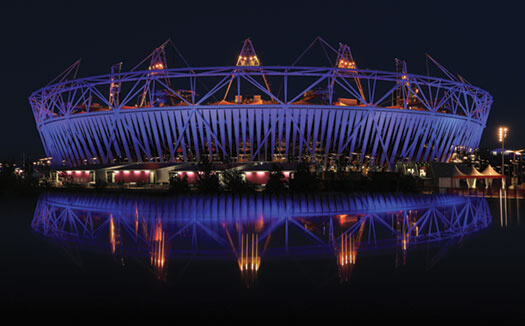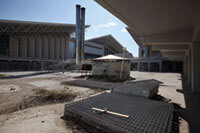Getting Torched

The Olympic Stadium in London’s Olympic Park is pictured prior to the 2012 Games. As an example of the sums of money that nations can spend on the worldwide contests, the opening ceremony alone for the 2014 Olympics in Sochi is expected to cost Russia about $52 million. Phil Walter/Getty Images.
Andrew Zimbalist ’69 has an inside track on the finances that drive Olympic bids and stadium deals. But are they a boon or a bust for the host cities?
Andrew Zimbalist ’69 will never forget the time that National Basketball Association Commissioner David Stern accused him of single-handedly trying to destroy the American sports industry. It was part of a rant that erupted, Zimbalist recalls, when he was advising the National Basketball Players Association opposite Stern at a negotiating table at the Waldorf-Astoria Hotel in New York City.
In 1998, NBA owners and players were battling in a lockout that slashed the regular season to fifty games. Zimbalist, an economics professor, had a reputation for sharp analyses that often shattered accepted wisdom. He and his group arrived early for the meeting and were sitting with their backs to high-rise windows in a room with commanding views of midtown Manhattan.
The last to enter was Stern, and the commissioner’s eyes remained fixed on the floor as he took his place at one end of the table. Billy Hunter, the players’ union chief, suggested they begin, when Stern intoned, “I see you have a new member on your side of the table.” After Hunter introduced “our economist,” Stern went into a diatribe that impugned him and a colleague, and, according to Zimbalist, culminated in a twenty-second crescendo during which Stern stood up and pumped the air with his arm, practically yelling, “If Zimbalist is on your side of the table, we might as well all take off our clothes, get on horses, and march down Fifth Avenue.”
The room went silent and Zimbalist felt like he had fallen into an alternative universe. “I’m saying, ‘Holy Toledo! What’s going on here?’ ” He later learned that Stern was known to berate individuals as a strategy to divide the opposition. “I’m sure he was trying to intimidate me,” says Zimbalist, adding, “David and I get along now. He is a brilliant commissioner, and I have great respect for him.”

This 2012 photo shows discarded fencing outside the Olympic indoor pool and the OAKA sports hall, leftovers from the 2004 Olympic Games in Athens, Greece. It’s not unusual for such facilities to fall into disrepair when cities can’t afford to maintain them. Oli Scarff/Getty Images.
Zimbalist, the Robert A. Woods Professor of Economics at Smith College in Northampton, Massachusetts, is no stranger to the ire of powerful people. In the two decades since his career took a sharp turn toward analyzing the enormous lucre surrounding sports, the field of sports economics has grown considerably. As one of its preeminent members, Zimbalist often testifies as an expert witness in court cases, acts as a consultant, and serves as a media expert. He has published at a prodigious rate on topics ranging from the commercialization of college sports, to how Title IX has affected society, to the internal dynamics of leagues.
It began in 1990, when a clash between baseball players and owners led to a thirty-two-day lockout that all but eliminated spring training. American fans were riveted, and Zimbalist’s eleven-year-old son Jeff was no exception. “I’m putting him to bed, and he says, ‘Dad, I don’t think I’m going to play Little League this year,’ ” Zimbalist recalls. Because the pros weren’t playing, Jeff assumed the lack of a season extended to his team.
“I didn’t know a heck of a lot about baseball economics, but I knew that wasn’t true,” Zimbalist says. From there ensued a discussion about the distinctions between the Major and the Little Leagues.
Then Jeff said, “Hey, Dad, you’re an economist, you like baseball, you just finished your book on Panama. Why don’t you write a book on the economics of baseball?” That was a Thursday night, and Zimbalist didn’t teach the next day, so he went to the basement of Smith’s Neilson Library and discovered two things: first, nobody had written about baseball economics in an accessible way, and second, “baseball had an antitrust exemption they got from the Supreme Court in 1922,” he says.
The realization started a churning process in Zimbalist’s mind. An acquaintance had recently spoken highly about Steve Fraser, an editor at Basic Books who liked the confluence of academic and popular writing. Zimbalist knew he had stumbled on a story about how powerful interests were leveraging an anachronistic privilege to profit handsomely from the national pastime. “On a lark,” he recalls, he dashed off a two-page book proposal that afternoon, thinking he would never get a response. Three weeks later, he had an advance to write Baseball and Billions, which became a business best seller.
The book clearly hit a nerve. Within minutes after Zimbalist did a public radio interview in New York to plug it, someone came into the studio holding up a sign saying that a big international law firm was on the phone. Weil, Gotshal & Manges was looking to enlist Zimbalist as an expert witness on behalf of Jets running back Freeman McNeil and the NFL Players Association in an antitrust suit against the league. At stake were the rules surrounding free agency. The players won.
In time, Zimbalist was called to testify before Congress and state legislatures on public policy issues relating to sports, encountering people such as George W. Bush (then a baseball team owner), then-baseball commissioner Fay Vincent, and U.S. Senator Howard Metzenbaum. He got into tangles with powerful owners and politicians, including then-New York City Mayor Rudy Giuliani, who was leading the charge for a new Yankee Stadium and was incensed by Zimbalist’s number crunching.
Sports economics was a brand new field, and Zimbalist’s models showed that more often than not, stadiums and arenas built at public expense ended up wreaking havoc with local budgets. The enormous hype around stadium projects — especially when owners threatened to leave one city in favor of another — muddied rational evaluation of the real costs and benefits.
“Sports is this massive thing in our culture and in many cultures around the world, and it gets an enormous amount of media attention,” says Zimbalist. This helps create what he calls “a natural, uncritical expectation” that wooing teams is “an unquestioned boon to the community.”
If Zimbalist is concerned about the effects of such sports mania on cities, he’s even more concerned about the effects on entire nations. His critique of mega sporting events — notably, the Summer and Winter Olympic Games and the quadrennial World Cup, governed by the Fédération Internationale de Football Association (FIFA) — is biting. In economic terms, he sees both organizations as monopolists that use that position to fuel bidding frenzies among cities vying for a turn on the world stage.
The way this tends to play out, he says, is that local organizing committees form that are initially made up of construction firms joined by labor unions and architects. Soon lawyers and bankers come on board, and together they grow into a big enough coalition for politicians to become enamored of their lustrous plans. This core group stands to gain a great deal from a civic project that requires the construction of massive sporting facilities, as well as infrastructure improvements capable of housing, feeding, transporting, protecting, and communicating with fans and media expected to flood the city for seventeen days.
At this stage, Zimbalist maintains, the International Olympic Committee (IOC) or FIFA play the role of glamorous sophisticate, challenging suitors to keep upping the ante by adding big-name architects to build dazzling structures in an attempt to outdo their rivals. This adds up to even more temptation for the moneyed interests who stand to profit mightily, whether or not the games ultimately benefit the community as a whole. In the meantime, the suitors spend lavishly on making a case based on civic pride and the virtue of sports, on a public relations campaign, and on hardball backroom dealings. The city of Chicago, Zimbalist says, spent $100 million on a losing Olympic bid.
The problem is that a dispassionate and honest economic analysis — not the kind of slick puff pieces dutifully produced by name-brand consulting firms at a hefty price — shows that, except under rare circumstances, these mega sporting events end up hurting the city or the country as a whole. The Athens Summer Olympics in 2004 may have contributed to the current financial turmoil in Greece, according to Zimbalist. Initially budgeted at about $2 billion, he says, the cost of the games ended up at $16 billion. Most of the venues built for the games now stand as decaying and eerily forlorn monuments to the hangover from a party that turned out to be too good. Plans to turn the Olympic Village into a community were never brought to fruition, says Zimbalist, and money to convert athletic facilities for local use evaporated.
The most plausible argument for hosting a mega event is that it brings in money from outside the country or region that can — in theory — boost the local economy. The problem is an irrational bidding process, says Zimbalist, that is driven by a monopolist on one side and local organizing committees that have successfully “hijacked” the political process on the other. Good economic models don’t look only at the upsides of these events; they also weigh them against the downsides.
Zimbalist and others in the field he helped to pioneer look at aspects such as whether the imperative to build quickly drives up labor costs, in turn leading to cost overruns and compromises that result in shoddy construction that ends up requiring significantly higher maintenance expenditures over time. The actual cost of the 2008 Beijing Olympics was $40 billion; the original budget was $5 billion to $6 billion.
Then there is the less tangible benefit a host city derives from projecting an image and gaining more prominence. “They all say that,” scoffs Zimbalist, but in reality, the cities have limited control over the impact of the publicity. A worst-case scenario is Munich 1972, which ultimately branded the city as the site of an atrocity when terrorists took Israeli athletes hostage in the Olympic village and later killed them.
Zimbalist ticks off a list of less dramatic discrepancies between aspirations and results. “The overriding impression left as a result of the Beijing Olympics is that it’s an impossible place to live and that they have unbearably thick pollution,” he says.
A city must also consider whether the influx of sports tourists drives away those who might otherwise have visited. Zimbalist cites studies showing that skiers avoided Utah during the 2002 Winter Olympics and that passenger traffic at the Atlanta airport during the 1996 games was on par with previous and subsequent years. The theater district in London this past summer was “like a ghost town” while the Olympics were happening in another part of the city, he says.
There are also significant land-use issues that must be added into the analysis. What could have been built in East London instead of an Olympics complex? Prime urban land is a scarce commodity, and a thorough economic analysis must encompass questions about opportunity costs, such as whether an arts complex, office buildings, or even a public park might be more beneficial in the long run.
“Leakage” is another consideration, Zimbalist notes. The postmortem on the Atlanta games showed that in spite of flat overall tourism, hotel prices went up. But rather than benefiting the local economy, that money mostly went to large concerns not based in the city.

Andrew Zimbalist became a sports economist when the field was in its infancy. Dick Fish/Smith College.
Zimbalist doesn’t mind being pilloried by tycoons, instead treating the outbursts directed at him as a badge of honor. But it wasn’t always that way. From the time he earned his degree at Wisconsin until that bedtime chat with his son, Zimbalist mainly concerned himself with comparing economic systems. He did his Harvard University doctoral dissertation on enterprise management in Salvador Allende’s Chile, a country he chose based on a tip from one of his undergraduate professors, UW economist John Strasma, that it had the most reliable and comprehensive statistical data in Latin America. He had also published a book measuring economic performance in socialist Cuba.
While at UW-Madison, Zimbalist originally intended to major in French, until he enrolled in a literature class in which he was the only male among forty-two students. And when he discovered that he was the only male student to apply for a study-abroad program in Aix-en-Provence, France, he quickly backed out. “The thought of going abroad with thirty-five or forty females was too intimidating for my young soul at the time,” he says.
In his first sixteen years, his academic focus was on global macroeconomics, systems, and development. His interest in athletics was just in passing. “I can’t say I was the biggest sports nut going, but I was an American male who paid attention to that stuff,” Zimbalist says. But he found that he enjoyed the new direction his career took: “As somebody who had basically studied the economies of the rest of the world all my life, I got very turned on to the idea of studying the U.S. political economy through the lens of sports.”
While on campus, he briefly became a history major before being captivated by a lecture given by Robert Lampman ’42, PhD’50, an economics professor who had worked for President Kennedy’s Council of Economic Advisers. “He was a lovely man who became a role model for me,” says Zimbalist. He promptly changed his major and became president of the Economics Student Association.
These days, Zimbalist has been working on projects such as an initiative with Commissioner of Baseball Bud Selig ’56 to sort out issues of revenue sharing. “Sports leagues are always trying to have some balance between the big city teams and the small city teams, so there’s ongoing interest in the competition,” Zimbalist explains. “The question is, ‘How do you structure that transfer of money in a way [so as] not to blunt the incentives?’ ” The economist also wrote a book on his fellow alum called In the Best Interests of Baseball? The Revolutionary Reign of Bud Selig.
Zimbalist co-edited his most recent book, International Handbook on the Economics of Mega Sporting Events, with Wolfgang Maennig, an economist at the University of Hamburg and gold medalist in rowing at the 1988 games in Seoul. The publication may have an impact on the decision now facing the IOC over which of the remaining contenders — Istanbul, Madrid, and Tokyo — will host the 2020 summer games. Zimbalist believes Brazil has taken on too much economic risk in seeking and winning both the 2014 World Cup, which will take place in seven cities, and the 2016 Summer Olympics in Rio de Janeiro.
Asked whether he thinks his scholarship will have an effect on future bidding processes, Zimbalist responds, “The ability of the private interests to co-opt the public interests, I think, is more limited when the public sees that there is no strong evidence of an economic payoff.” At the same time, he hopes that members of FIFA and the IOC can be moved not only by the lures of grandiosity, but also by moral considerations.
“One would hope that they get the message and downscale some of this crazy bidding that goes on,” he says. “There are some smart people and sensitive people who have a sense of social responsibility and responsibility to humanity. They know that there are sustainability issues when they build like crazy things that are not going to last. … Maybe members of the IOC executive committee will step forward and say, ‘We should be re-evaluating our model; we could still be a bureaucracy and be socially responsible, and that will be our source of kudos, that will be our source of gratification.’
“Maybe,” says Zimbalist, “but I wouldn’t predict that.”
Eric Goldscheider is a freelance writer based in Amherst, Massachusetts.
Published in the Spring 2013 issue



Comments
No comments posted yet.